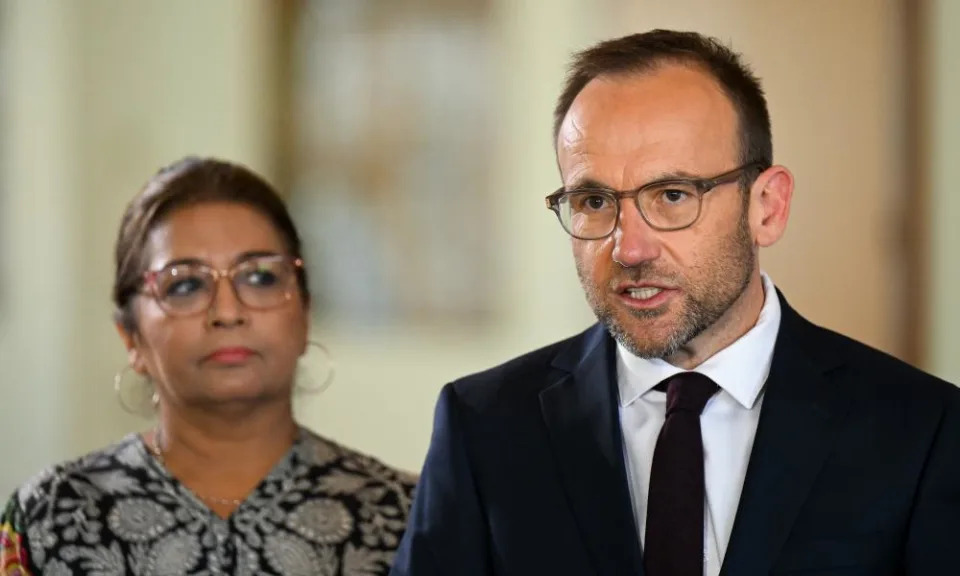Adam Morton and Josh Butler
Tue, 21 February 2023

Photograph: Lukas Coch/AAP
The Greens have accused Labor of “making the climate crisis worse” and being more interested in opening new coal and gas mines than working together to improve climate policy after the government approved a new coal seam gas expansion in Queensland.
Documents posted on the environment department website show the environment minister, Tanya Plibersek, on Friday approved a project by the oil and gas company Santos to open 116 new coal seam gas wells in Queensland’s Surat Basin.
The approval under national environment law, signed off by an official on Plibersek’s behalf, allows the company to construct and operate the wells at the Towrie gas development to feed a liquefied natural gas (LNG) export facility at Gladstone. It says the wells can have an operational life of about 30 years and the approval is valid until 2077.
The Greens attacked the decision, which comes as the minor party is negotiating with Labor over the design of the safeguard mechanism, a policy the government has promised to transform to cut emissions from Australia’s 215 biggest polluting industrial facilities.
Related: Safeguard mechanism: what is it, will it cut emissions and what role do carbon offsets play?
Adam Bandt, the Greens leader, has offered to support the policy, despite having other reservations about the design, if the government stops approving new fossil fuel developments. Labor has rejected the proposal, arguing it would breach an election commitment and decisions on new coal and gas developments were for investors.
In a Twitter thread, Bandt accused Labor of “wanting coal and gas corporations to keep polluting, profiting, and opening more mines”. He said Plibersek had granted the approval on Friday without issuing a media release or public statement, and Santos had donated at least $521,719 to Labor since 2015.
“For a government that likes to talk about integrity and transparency this is straight out [of] Morrison’s playbook,” Bandt said.
The independent MP Monique Ryan also focused on Santos’ donations to Labor. “You’d have to say they’ve received an excellent return on their investment,” she said in a tweet.
A spokesperson for Plibersek said Santos’ proposal was assessed on its merits. “It was subject to robust scientific assessments, and strict environmental approval conditions have been applied,” they said.
Santos already has a large coal seam gas operation in the Surat Basin, with more than 8,000 wells approved since 2010 connected to its GLNG export development. The company said it welcomed the government’s decision. A spokesperson said it would spend “more than a billion dollars this year alone” drilling new wells and developing infrastructure to supply long-term contracts in Korea and Malaysia.
Rod Campbell, research director with the Australia Institute, said while the latest development was not massive compared to others, the decision illustrated that major fossil fuel projects were often approved and expanded through a series of small decisions that added up to a significant impact.
“Our systems are entirely set up to approve these fossil fuel developments, sometimes piece by piece,” he said. “It really needs to change so the government is asking ‘do we need these any more?’”
The independent senator David Pocock who, like the Greens, is negotiating with the government over the safeguard mechanism design and a list of other policies, said scientists and the International Energy Agency had been “absolutely clear” that the world could not could not afford to keep opening new coal and gas facilities if they wanted to keep global heating to 1.5C or 2C above pre-industrial levels.
On the safeguard mechanism, Pocock said he had several concerns, particularly the government’s proposal to allow companies to buy an unlimited number of carbon offsets to meet emissions limits. “I think there is a number of measures to improve the integrity and ensure that we are actually driving down emissions,” he told the ABC.
He also backed the introduction of a climate trigger into the Environment Protection and Biodiversity Conservation (EPBC) Act so emissions would have to be considered before developments were approved.
The climate change minister, Chris Bowen, said he believed the government had “the balance right” on the safeguard design, but acknowledged changes were possible following consultations with companies, interest groups and others in parliament.
“I’ll sit down with people in good faith across the parliament. What we do will be in keeping with, one, our election commitments and, two, what we need to do in the national interest,” he said.
Greens’ deputy leader Mehreen Faruqi said: “The Greens will continue negotiations, but Labor seems to want new coal and gas mines more than they want their safeguard mechanism.”
Under its proposed changes, Labor would set a new pollution limit, known as a baseline, for each big polluting site based on emissions intensity. Baselines would mostly be reduced by 4.9% a year. Companies could meet their limit through direct cuts or by buying carbon credits, meant to represent cuts made elsewhere.
Academics and activists have raised concerns over whether some carbon credit projects deliver real and new emissions reductions. A review of the carbon credit scheme commissioned by the government said the system had integrity, but critics have called for an evaluation of individual projects.
No comments:
Post a Comment